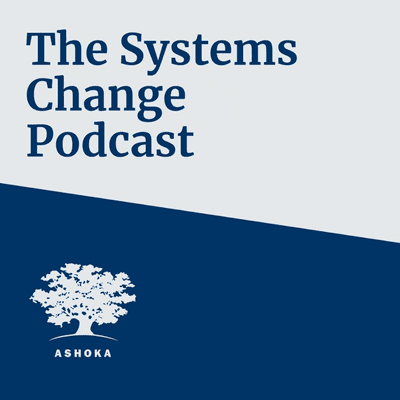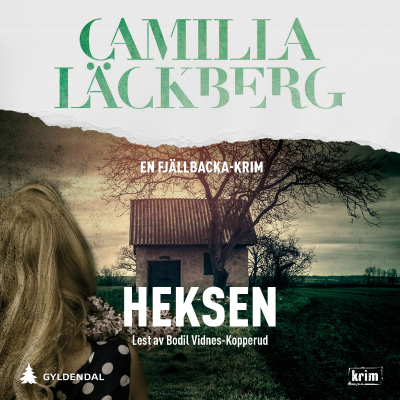
The Ashoka Systems Change Podcast
Podkast av Ashoka Globalizer
Prøv gratis i 14 dager
99 kr / Måned etter prøveperioden.Avslutt når som helst.

Mer enn 1 million lyttere
Du vil elske Podimo, og du er ikke alene
Rated 4.7 in the App Store
Les mer The Ashoka Systems Change Podcast
Ashoka’s Globalizer team is launching a 6-episode podcast series on systems change. They have partnered with the well-known Inspiring Social Entrepreneurs podcast and host Fergal Byrne for the project. The first episode is an introductory episode featuring a conversation between Fergal and Odin Muehlenbein, a partner at Ashoka Germany and lead of the Systems Unit at Ashoka Globalizer. Fergal and Odin discuss the basics of systems change and why it’s important for social entrepreneurs and funders to think and act systemically. The remaining five episodes feature a short introduction from Odin and Fergal before launching into inspiring discussions of how these Ashoka Fellows use systems change approaches in their work. Throughout the episodes, you will meet five of the world’s leading changemakers: Meet Jordan Kassalow in episode 1 where Fergal and Jordan discuss the motivation to work on a systems level Learn from the renowned Jeroo Billimoria on how to weave networks to achieve system changes in episode 2 Michael Sani underscores the importance of well-being and personal development in episode 3 Learn how Kendis Paris achieves policy changes and creates changemakers in episode 4 Get the funder perspective from Silvia Bastante of Co-Impact on funding systems change in episode 5. Please listen to the podcast on iTunes and leave an honest review. Share it with fellow changemakers and funders and continue the conversation using #systemschange and @ashoka. We can all have more impact together if we work systemically. The Ashoka Learning and Action Center and Globalizer teams have also written a report featuring five case studies from leading Ashoka Fellows and how they use systems change in their work. In that report, you will learn more about controversy facing the field, but also how Ashoka’s focus on systems change makes it so that this controversy does not even apply to them precisely because of the systems changing ways they work. Please read the report here and share with your colleagues, fellow changemakers, and potential funders. Get involved in the conversation by posting your thoughts using the hashtag #systemschange and @ashoka!
Alle episoder
10 EpisoderThis episode invites you to a conversation among the representatives of three fields – a social entrepreneur, a former government official and a funder interested in supporting cooperation between social entrepreneurs and governments. Listen to the experiences and recommendations of Denisa Livingston, an Ashoka Fellow empowering Navajo communities to take control of food policy through Diné Community Advocacy Alliance (US), Maria Vassilaku, former deputy mayor of Vienna (Austria) and Jim Anderson, Director of Government Innovation at Bloomberg Philanthropies (US). If you are interested to learn more about how social entrepreneurs can effectively work with government and what are the examples, we encourage you to have a look at our new free online course on this topic at https://academy.vc4a.com/courses/trabajo-con-el-gobierno/ [https://academy.vc4a.com/courses/trabajo-con-el-gobierno/] (Spanish version) and www.ashoka.org/working-with-government [http://www.ashoka.org/working-with-government] (English version). The online course and the second season of the Ashoka Systems Change podcast were developed thanks to the support and in partnership with PES Latam.
The third episode of season two examines how cooperation among social entrepreneurs can help governments design effective support measures for the whole field of social entrepreneurship. We spoke to Markus Sauerhammer, Chair of the German Association of Social Entrepreneurs, and learned what helped them get to the point when every political party in Germany references social entrepreneurship in their program. If you are interested to learn more about how social entrepreneurs can effectively work with government and what are the examples, we encourage you to have a look at our new free online course on this topic at https://academy.vc4a.com/courses/trabajo-con-el-gobierno/ [https://academy.vc4a.com/courses/trabajo-con-el-gobierno/] (Spanish version) and www.ashoka.org/working-with-government [http://www.ashoka.org/working-with-government] (English version). The online course and the second season of the Ashoka Systems Change podcast were developed thanks to the support and in partnership with PES Latam.
In the second episode of Season 2, Sascha Haselmayer and Olga Shirobokova explore the role communities play in keeping governments accountable. You will hear examples of how social entrepreneurs from Peru, the UK, Romania, India and the US empower people affected by a social problem to take charge and effectively engage with governments in order to improve public services. If you are interested to learn more about how social entrepreneurs can effectively work with government and what are the examples, we encourage you to have a look at our new free online course on this topic at https://academy.vc4a.com/courses/trabajo-con-el-gobierno/ [https://academy.vc4a.com/courses/trabajo-con-el-gobierno/] (Spanish version) and www.ashoka.org/working-with-government [http://www.ashoka.org/working-with-government] (English version). The online course and the second season of the Ashoka Systems Change podcast were developed thanks to the support and in partnership with PES Latam.
The second season of the Ashoka Systems Change podcast explores how social entrepreneurs can effectively work with governments to improve systems together. In Episode 1 you will hear a conversation between Sascha Haselmayer, a seasoned social entrepreneur and an Ashoka Fellow who has worked with 135 municipal governments across the world to improve the provision of public services, and Olga Shirobokova, co-lead of the Systems Unit at Ashoka Globalizer. Sascha shares how his approach to addressing a social problem has evolved over time - from being fixated on his own solution to seeing his solution as a seed or a stepping stone in a bigger story, where there is more space for co-creation and mutual support between multiple stakeholders, including government. If you are interested to learn more about how social entrepreneurs can effectively work with government and what are the examples, we encourage you to have a lookt at our new free online course on this topic at https://academy.vc4a.com/courses/trabajo-con-el-gobierno/ [https://academy.vc4a.com/courses/trabajo-con-el-gobierno/] (Spanish version) and www.ashoka.org/working-with-government [http://www.ashoka.org/working-with-government] (English version). The online course and the second season of the Ashoka Systems Change podcast were developed thanks to the support and in partnership with PES Latam.
Silvia Bastante de Unverhau is a leading expert in philanthropy, with over 20 years of experience working across the international development, non-profit, business, and government sectors. She is currently the Chief Philanthropy Officer at Co-Impact, a collaboration between donors that pledged 500 million dollars for systems changing initiatives. In the interview, Silvia talks about the principles of funding systems change work, how it differs from traditional funding practices, and how foundations can adopt this new mindset. She also has tips for social entrepreneurs who are looking for funding for systems change work from a donor's perspective. Key questions: How is funding systems change different? How should foundations support systems change?

Rated 4.7 in the App Store
Prøv gratis i 14 dager
99 kr / Måned etter prøveperioden.Avslutt når som helst.
Eksklusive podkaster
Uten reklame
Gratis podkaster
Lydbøker
20 timer i måneden

































